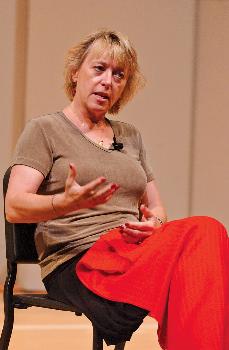Nobel Peace Prize-winning activist Jody Williams spoke in Roussel Auditorium the night of Sept. 29 about her efforts to ban anti-personnel landmines, as well as a wide variety of other current global issues.
Williams is the founding coordinator of the International Coalition to Ban Landmines and is one of eleven women in history to have been awarded the Nobel Peace Prize. As chief strategist and spokesperson of the ICBL, she won the Nobel Prize in 1997 when an international treaty banned landmines. As of this year, more than 150 countries have signed the treaty.
Her speech focused on the responsibility of the individual concerning global issues.
“What is democracy?” she said. “It’s not just voting … Anybody can make a difference in the world if you just get off your butt and do something.”
She explained how landmines are called “the eternal soldier” because they can stay active a hundred years after being placed. Landmines rarely kill instantly, she said. They are designed to “blow your foot off,” and victims without access to medical care often bleed to death. Even with medical attention, most victims will lose their foot and may suffer secondary injuries from debris and splintered bone material.
Williams’ talk lasted about 35 minutes. She spent the remaining hour and a half in a conversation with the audience, answering its questions.
The audience was interested to hear her position and opinion on many current events, and Williams had an in-depth response for each question. Williams herself wore a red shawl in honor of the monks in Myanmar who police attacked during peaceful protests.
She commented on the controversy surrounding the Red Cross’s use of money donated for Hurricane Katrina, the significance of the protests of anti-war activist Cindy Sheehan and the collective action that could be taken against Darfur and should, she believes, have been used against Iraq instead of invasion.
Despite the gravity of the topics, Williams kept the audience laughing throughout the entire lecture with her biting sense of humor. She spoke of the irony of being called a humanitarian because, “I’m one of those humanitarians who likes the concept of humanity. I’m not actually impressed with human beings.” She mentioned how she discovered she wasn’t meant to be a teacher as she spent time teaching kids English as a second language.
“I cried every single day. I had to teach them when I really wanted to slap them,” she said.
Williams’ connection with the audience was obvious after the presentation.
“There were so many global issues (discussed),” said Jesus Garcia, psychology sophomore. “She (effected) some very positive changes.”
“I was extremely impressed by what she’s done and what she had to say to students,” said Elliot Sanchez, philosophy senior and president of the Student Government Association. “Her willingness to talk with and help anyone in attendance showed that she still believes that each of us can begin that process of change.”
Katie Urbaszewski can be reached at








